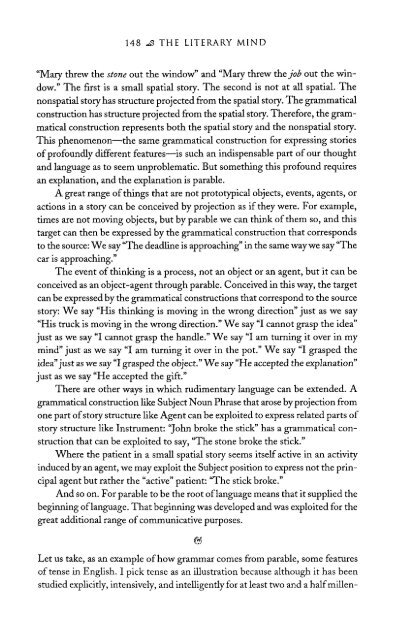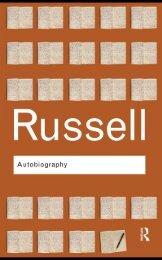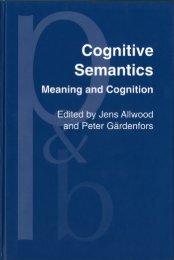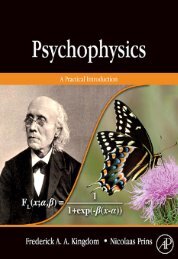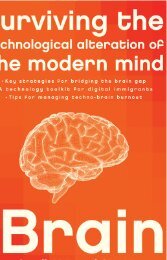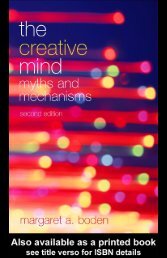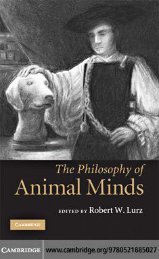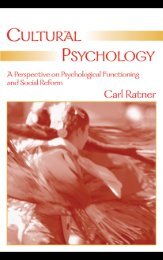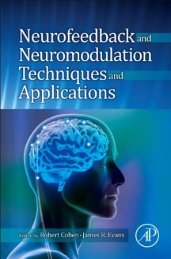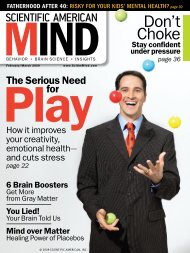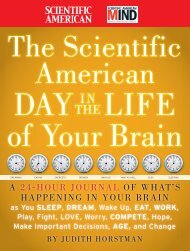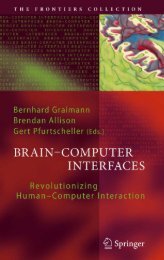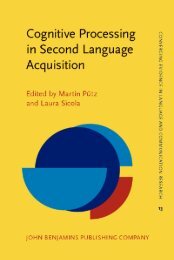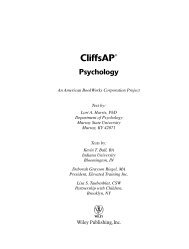The Literary Mind.pdf
The Literary Mind.pdf
The Literary Mind.pdf
You also want an ePaper? Increase the reach of your titles
YUMPU automatically turns print PDFs into web optimized ePapers that Google loves.
148 THE LITERARY MIND<br />
"Mary threw the stone out the window" and "Mary threw the job out the window."<br />
<strong>The</strong> first is a small spatial story. <strong>The</strong> second is not at all spatial. <strong>The</strong><br />
nonspatial story has structure projected from the spatial story. <strong>The</strong> grammatical<br />
construction has structure projected from the spatial story. <strong>The</strong>refore, the grammatical<br />
construction represents both the spatial story and the nonspatial story.<br />
This phenomenon—the same grammatical construction for expressing stories<br />
of profoundly different features—is such an indispensable part of our thought<br />
and language as to seem unproblematic. But something this profound requires<br />
an explanation, and the explanation is parable.<br />
A great range of things that are not prototypical objects, events, agents, or<br />
actions in a story can be conceived by projection as if they were. For example,<br />
times are not moving objects, but by parable we can think of them so, and this<br />
target can then be expressed by the grammatical construction that corresponds<br />
to the source: We say "<strong>The</strong> deadline is approaching" in the same way we say "<strong>The</strong><br />
car is approaching."<br />
<strong>The</strong> event of thinking is a process, not an object or an agent, but it can be<br />
conceived as an object-agent through parable. Conceived in this way, the target<br />
can be expressed by the grammatical constructions that correspond to the source<br />
story: We say "His thinking is moving in the wrong direction" just as we say<br />
"His truck is moving in the wrong direction." We say "I cannot grasp the idea"<br />
just as we say "I cannot grasp the handle." We say "I am turning it over in my<br />
mind" just as we say "I am turning it over in the pot." We say "I grasped the<br />
idea" just as we say "I grasped the object." We say "He accepted the explanation"<br />
just as we say "He accepted the gift."<br />
<strong>The</strong>re are other ways in which rudimentary language can be extended. A<br />
grammatical construction like Subject Noun Phrase that arose by projection from<br />
one part of story structure like Agent can be exploited to express related parts of<br />
story structure like Instrument: "John broke the stick" has a grammatical construction<br />
that can be exploited to say, "<strong>The</strong> stone broke the stick."<br />
Where the patient in a small spatial story seems itself active in an activity<br />
induced by an agent, we may exploit the Subject position to express not the principal<br />
agent but rather the "active" patient: "<strong>The</strong> stick broke."<br />
And so on. For parable to be the root of language means that it supplied the<br />
beginning of language. That beginning was developed and was exploited for the<br />
great additional range of communicative purposes.<br />
Let us take, as an example of how grammar comes from parable, some features<br />
of tense in English. I pick tense as an illustration because although it has been<br />
studied explicitly, intensively, and intelligently for at least two and a half millen-


